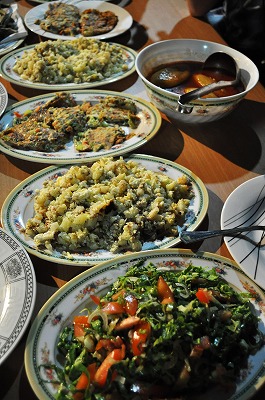I visited Khawla‘s house for the first time purely by chance. I had been fascinated by Arabic food since arriving in Israel from Japan for an internship with Sindyanna of Galilee, and I wanted to learn the art of cooking. Khawla became my first Arabic cooking teacher.
Although I am not skilled at working with my hands, I enjoy spending time with the women at Sindyanna’s Visitors Center in the Arab village of Kufr Manda in Galilee, Israel. Not only are they exceptionally friendly and a pleasure to be around, but they also truly enjoying “working” at Sindyanna. They are not forced to come to the Center; they come because they enjoy it. Working outside the home is not a common thing for village women (about 80% of all Arab women in Israel are unemployed).
In Japan today, working outside the home is common for women under 35. It seems so natural that they would not think of being grateful for the right to work. In fact, the younger generation in Japan tends to tire of their jobs, because they are obliged to work, and because salaries and labor conditions have worsened.
Khawla Azzam (53) was the ninth of her mother’s ten children. She was born and raised in Kufr Manda, one of Israel’s poorest Arab villages. She is the mother of three sons and five daughters, and she already has twelve grandchildren. As a child, she wanted to be a nurse; however, she was never able to fulfill her dream because she had to quit school. In those days, there were no schools in Kufr Manda, and her family’s living situation would not allow her to attend a school in Nazareth 20 km. away. Khawla married at the age of nineteen and has been busy ever since, caring for her children, but she never let go of the dream to work outside the home.
If Khawla’s childhood dream of becoming a nurse had been realized, it would have been the perfect job for her, because she is truly a caring person. Wa reminds me of my mother, who lives in Japan. Although she does not look like my mother, I could not help but feel a sense of motherhood when I was around her, because of her kindly face and affectionate behavior.
Khawla acquired her cooking skills from her mother. She cooks efficiently, as if using magic, and everything is delicious. She said that cooking is a form of art for her, and she has always endeavored to create the best dishes in terms of taste and appearance. During my stay at her house, she cooked various kinds of foods. She passes her recipes down to her daughters, just as her mother passed them down to her.
While hosting me, Khawla continued to perform housework, and it seemed as though she barely rested during the day. Once, when I returned to her home from a short trip around Kufr Manda guided by her son and daughter, she was sound asleep on the sofa in the living room. One of her daughters brought her a blanket and slid onto the sofa, holding Khawla behind her as they both slept. When Khawla noticed that I had returned, she promptly woke up. I felt badly because I was the one who had awakened her. However, one of her woman friends in Sindyanna said that Arab women always work hard, regardless of whether they have a guest, and it is their custom to entertain guests at any cost.
In 2008, Khawla started taking part in the basketry workshop held at Sindyanna’s Visitors Center. She told me that the workshop brought many changes into her life. Because her children had grown up, she felt that she had lost her purpose in life. She was introduced to Sindyanna through a woman that had started a basketry workshop in the Center some months before. She is good at working with her hands and enjoys creating small accessories, and so, her basket-weaving skills have rapidly improved. She currently plays an active role as an assistant teacher on the Sindyanna basketry team. Completely absorbed in the work, she makes baskets at both the Center and at home. At last she has fulfilled her childhood dream of working outside the home. ”I never felt empty after starting to work at Sindyanna,” she says, ”and I am very grateful to Sindyanna for making my life colorful.”
Khawla says that the companionship she has found with the women at the Visitors Center is among the most precious things in her life. In the past she used to stay at home most of the time and did not have opportunities to socialize. Now she has many good friends with whom she can share her feelings while weaving baskets.
When Khawla first started working at Sindyanna, her family wanted her to stay home, even though the income she received from selling her baskets helped them. She strove to convince her family that working at Sindyanna would be good for all, but I guess it was a struggle. Today, her family supports the things she wants to do. One of her daughters has also started to learn basket weaving at Sindyanna’s Center, and many of her works are displayed at Khawla’s house.
As a working-woman and a mother, Khawla today enjoys a fulfilling life. I greatly appreciate knowing someone who displays professionalism as a mother and as an artisan. She has made me realize just how fortunate I am to have many options in my life and to be able to make decisions for myself.
Chihiro Imaizumi / October 8, 2012






